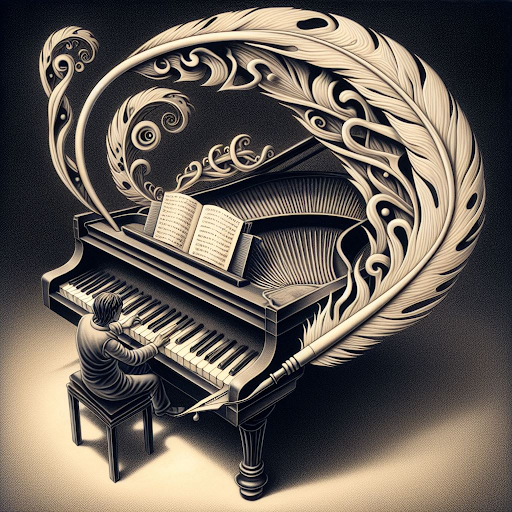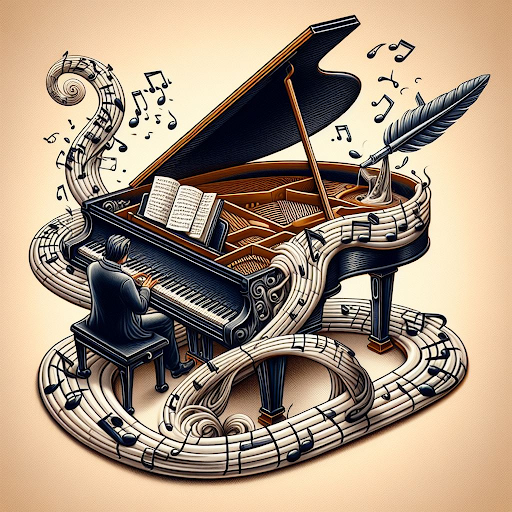Symbolic Manipulation
I encourage all my piano students to write. When I give this suggestion, many of them looked confused. (If their parent is in the room, I sometimes catch them checking the time.) It is already an oft-stated fact that writing is learning, so I will not convince you of that here if you have not encountered this idea. Those who do write, whether for others or for themselves, quickly see that it is the best way to audit your inner life. If I am writing in a steady rhythm, it all becomes a sort of musical verse that fits together in a strange and magical way that we cannot express in simple terms.
Many young people, especially among the population of students whose parents send them to extracurriculars, lack a strong direction for what they want to do in the future. Often they are learning the piano to beef up their university applications, so are focused mainly on taking exams and joining festivals or competitions. The room for them to explore their own artistic interests (or to even know what artistic interests entail outside of doing whatever your teacher says) is severely limited.
When I get them to scribble in their notebook (often one they bring that I neglect to write in, but if not a cheap one from the dollar store that I have on hand), they find it strange. They may tell me, words are not how they express their thoughts. Yet, they used words to say that to me! For one student, I typed everything she said during her tirade about how she was uncomfortable with using words to express herself, and how she had nothing interesting to say. After she were done, I read exactly what she said back to them, word by word—I type at a hundred and ten words per minute (110 WPM)—and could see something dawn on her face. A few weeks later, she was even playing the piano better, especially for sightreading prima vista. It was like something unlocked in her, after the latent trauma of her first Chinese piano teacher freaking out at her for her mistakes. (Her words, said quietly with glistening eyes after I hinted at the common origin story.)
Art is a life in another medium. We speak through another conduit, and develop a sense of how we can inhabit a new body. Among artforms, I feel that the world of words is the most expressive, not least because it is so portable, modular, and adaptable. Even the simplest words can have so much meaning, not least because it is perhaps the most everyday of our forms of expression. If you have ever said anything original (or even just said it in some plausible sense of “your own words”), you have already written. The only difference is: are you brave enough to write it down?
Showing people how I write is the best way for people to understand me and what I am doing, of seeing how my philosophy for life plays out on the page. If a hypothetical in the mind of a thinker is a future lived, then writing on the page is a way of reaching beyond the current moment and tapping into something ineffable and magical. Few people who have experienced the power of language, whether from themselves or from others, can resist the urge to call it magic. In the end, magic is but the direct method by which thought changes reality.
The point of poetry, perhaps, is changing the way we formulate our lowly phrases so that they sing with heavenly grace and muse, becoming more than what the words pretend to carry in their lowly earthly station. For something past the text is speaking out, and we have known the truth before it came.
I get regular headaches from typing and reading. I enjoy it, in a weird way! I am getting used to the rhythm of my thoughts. The best part is that I have no need to think of everything at once. For example, this very essay came out of me copy-pasting notes from a lesson today, where I encouraged yet another student to write. I first asked her about how she learned Chinese (in the context of drawing an analogy between language and music), then upon her answers that it was mostly auditory and contextual told her that she should practice studying the patterns of her own thoughts and of others’ utterances. I told her that among all things I could tell her about piano or otherwise, starting a writing habit was the best way to help her thrive as a person. If she wanted to pursue a math major, as she told me before, she would have to write proofs—and what was that, but yet another form of symbolic manipulation?
She looked unconvinced. But she will try it. Hopefully, the method shall speak for itself.
ChatGPT to Bing Image Creator: An Escher-inspired scene depicts a piano intertwined with a quill pen, merging musical notes with flowing ink. Within the composition, a figure sits at the piano, their hands poised over the keys while simultaneously holding a notebook, pensively contemplating the connection between music and writing. The surreal imagery evokes the intertwined nature of creative expression and self-discovery, inviting viewers to explore the symphony of inner thoughts through the written word.







Comments
Post a Comment